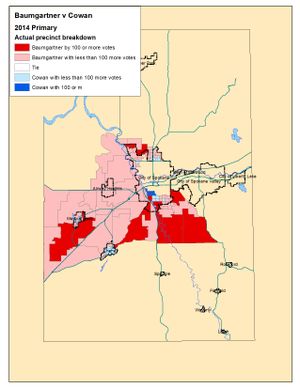GOP control of Senate likely in 2015 unless…
Mapping the vote: Here's how the votes in the 6th District Senate Primary shape up. For a bigger view of those results, or to compare them with a hypothetical matchup from 2012 *, click on the documents below.
OLYMPIA – Republicans are in the driver’s seat to control the Washington Senate in 2015 unless Democrats can improve their showing in a handful of races like Spokane’s 6th District contest between incumbent Sen. Mike Baumgartner and challenger Rich Cowan.
Primary results from the Baumgartner-Cowan race aren’t as close as some other contests, but with relatively few competitive districts left after the 2011 redrawing of district boundaries it’s likely to get the most attention of any Senate election in Eastern Washington. . .
To read the rest of this item, or to comment, continue inside the blog.
*Baumgartner and Cowan didn't run against each other in 2012, but they were both on the ballot, running for federal office, against incumbent opponents and both lost in the 6th Legislative District. Just for the heck of it, we compared their vote totals from the Senate and House races with the primary vote totals. They are remarkably similar.
. . . If the primary is a harbinger of November, Republicans will have 25 seats next year and their first true majority since 2004. They won’t need help from Tim Sheldon, a Democrat who joined with them to form a controlling coalition in 2013-14. Sheldon is currently running second to Democratic challenger Irene Bowling in their South Puget Sound district. But both go to the general election because of the state’s primary system and Sheldon, a conservative Democrat, could pick up much of the support that went to Republican Travis Couture, who finished a close third.
The other senator who crossed the aisle to create the Majority Coalition Caucus, Sen. Rodney Tom, didn’t seek reelection.
Much attention will be focused on a pair of Puget Sound races in which a freshman incumbent of each party finished a two-person primary with less than 55 percent of the vote against a challenger who will be on the general election ballot. Democrat Steve Hobbs has 52 percent of the vote against Republican Jim Kellett in Snohomish County’s 44th District and Republican Andy Hill has 54 percent of the vote against Democrat Matt Isenhower in suburban King County’s 45th District. In each case, the challenger did well despite being significantly outspent, but the incumbent has far more money in the bank right now for the general election.
Twenty-four of the Senate’s 49 seats aren’t up for election this year, and there the Republicans have a 13-to-11 edge. That advantage is neutralized, however, by two races in which a Democratic incumbent is running unopposed. Of the 23 other seats on the ballot, some are in districts where two candidates of the same party are advancing to the general, so party affiliation won’t change even if the senator does.
Outside of the Sheldon-Bowling contest, Democrats have three races in which the winner will be a member of their party and Republicans have two, one of them the 7th District race between incumbent Brian Dansel and challenger Tony Booth.
In nine other primary races, five Democrats and four Republicans collected more than 60 percent of the votes against primary challengers and should have a relatively easy time winning the general election. Most are well-funded incumbents, although Republican Judy Warnick and Democrat Cyrus Habib are House members running for open seats previously held for many years by their party.
That leaves six races in which the incumbent collected between 55 percent and 60 percent of the primary vote, a result which is difficult but possible for a challenger to overcome in the general election with a strong campaign and enough money. In five of those races, a Republican is on top.
The 6th District race is in that group: Baumgartner currently has about 57 percent of the votes in nearly complete returns.
That’s a better primary margin than Baumgartner had four years ago against Democratic incumbent Chris Marr, but not an insurmountable lead based on history. Marr collected only 43 percent of the primary votes against Republican incumbent Brad Benson in the 2006 but won the general election. Longtime political observers will note that district boundaries were redrawn in 2011 and more Republican-leaning precincts were added.
In those two previous elections, the 6th District had the most expensive state Senate race in Washington. Baumgartner and Cowan between them have currently raised more than $500,000, making it the third-highest total for donations at this point in the campaign season.

